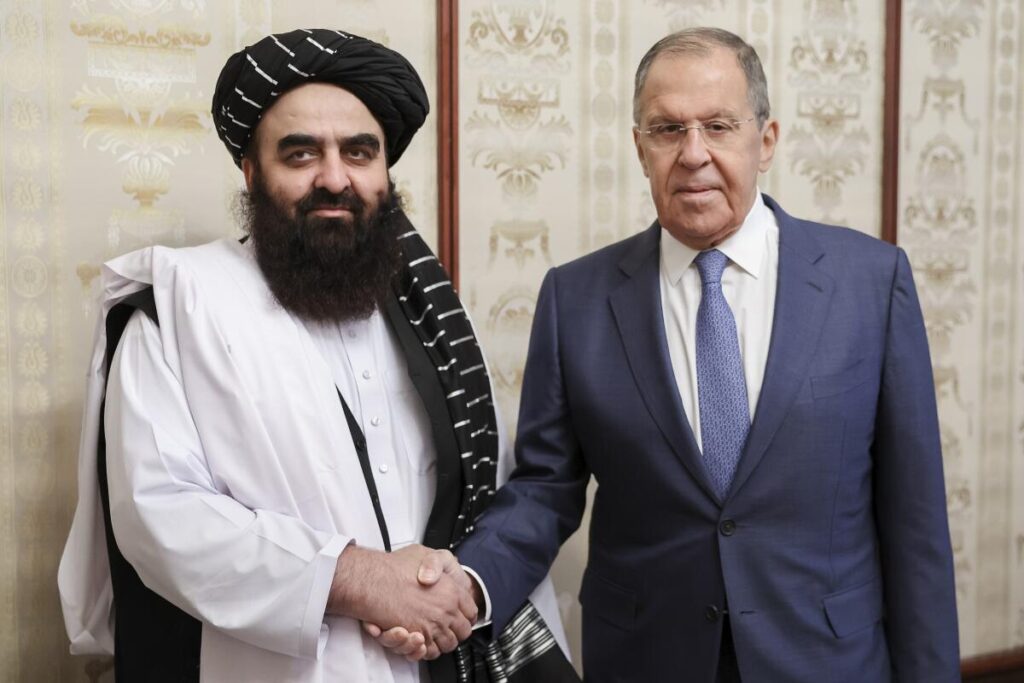In a groundbreaking yet controversial move, Russia has officially recognized the Taliban government in Afghanistan, becoming the first country to do so since the group’s return to power in August 2021. The recognition, announced Thursday, was met with a mix of diplomatic optimism from Moscow and Kabul and sharp criticism from Afghan civil society and international human rights advocates.
A New Era of Engagement?

Russian Foreign Minister Sergey Lavrov confirmed the decision, citing potential for future cooperation in energy, transportation, agriculture, and infrastructure. Afghanistan’s Foreign Minister Amir Khan Muttaqi hailed the move as “courageous,” saying it ushers in a “new phase of positive relations, mutual respect, and constructive engagement.”
Since the Taliban’s return, most nations have refused to recognize their government, largely due to the group’s harsh enforcement of Islamic law, especially restrictions on women’s rights, freedom of speech, and education. Russia’s decision to break ranks with global consensus could signal a significant geopolitical shift.
Widespread Condemnation
The reaction from Afghan civil society has been swift and intense. Former Afghan parliamentarian Fawzia Koofi warned that recognition would “legitimize impunity” and threaten both Afghan stability and global security.
The Afghan Women’s Political Participation Network issued a scathing response, calling Russia’s recognition “a greenlight to a regime that is authoritarian, anti-women, and actively dismantling basic civil rights.”
“Russia has not only forgotten its destructive role in the Soviet invasion but is now enabling a new form of political suppression under the Taliban,” the network added.
A Complex Historical Relationship
The move also highlights the complicated history between Russia and Afghanistan. In 1979, the Soviet Union invaded Afghanistan, triggering a brutal nine-year war that ended in 1989 after the deaths of 15,000 Soviet troops. Today’s move, some critics say, echoes past mistakes under a new guise.
Despite this history, Russia has maintained a diplomatic presence in Kabul. Unlike most Western nations, it did not close its embassy after the Taliban takeover and was also the first to sign an international economic deal with the Taliban in 2022 to supply oil, gas, and wheat.
Earlier this year, Russia removed the Taliban from its list of terrorist organizations, and in 2023, President Vladimir Putin referred to the group as an “ally” in the fight against terrorism.
Global Implications and What Comes Next
Russia’s recognition may set a precedent for others. China, the UAE, Uzbekistan, and Pakistan have already appointed ambassadors to Kabul without formally recognizing the Taliban regime. Analysts say Moscow’s move could pave the way for other countries to follow suit, particularly those seeking influence in Central Asia or access to Afghanistan’s untapped mineral resources.
However, strict UN sanctions still remain in place, including the freezing of about $9 billion in Afghan assets. The United Nations has also described the Taliban’s restrictions on women and girls as tantamount to “gender apartheid.”
With global eyes now on how this diplomatic shift unfolds, Russia’s recognition of the Taliban may have far-reaching implications, not only for Afghanistan but also for international norms on governance, human rights, and extremism.

